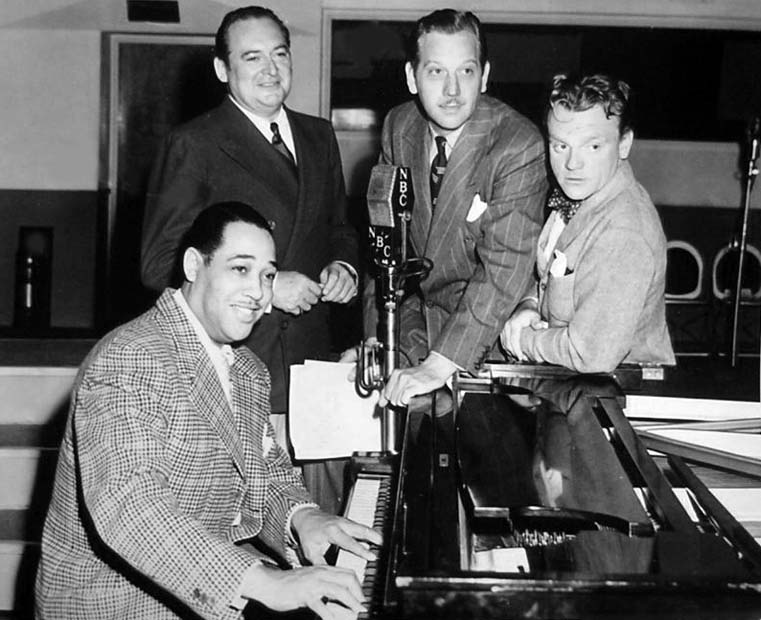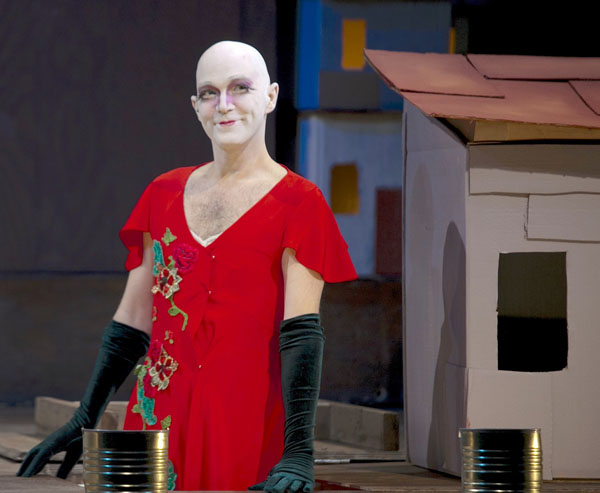Duke Ellington plays Billy Strayhorn’s “Lotus Blossom” in Copenhagen in 1967:
(This is the latest in a series of arts-related videos that appear in this space each Monday and Wednesday.)
Archives for 2013
TT: Almanac
“Music expresses that which cannot be said and on which it is impossible to be silent.”
Victor Hugo, William Shakespeare
UP ON THE ROOF
“The history of the Broadway musical in the 20th century is also a not-so-secret history of the parallel project of Jewish assimilation in America. Nearly all the best-remembered golden-age musicals were written in whole or part by first- and second-generation Jewish immigrants, but scarcely any of them had explicitly Jewish subject matter–or, in most cases, recognizably Jewish characters. Their creators, most notably Richard Rodgers and Oscar Hammerstein II, preferred to write deracinated, determinedly optimistic fables of the American dream in action…”
TT: See you on the radio (cont’d)
 Tonight I’ll be talking live about Duke: A Life of Duke Ellington on Wisconsin Public Radio. The program is Central Time and the half-hour segment, hosted by Cynthia Schuster, will start at 6:05 p.m. ET on WHAD-FM.
Tonight I’ll be talking live about Duke: A Life of Duke Ellington on Wisconsin Public Radio. The program is Central Time and the half-hour segment, hosted by Cynthia Schuster, will start at 6:05 p.m. ET on WHAD-FM.
For more information, or to listen on line in streaming audio, go here.
TT: Romping with Bertolt Brecht
In today’s Wall Street Journal drama column I report on two much-discussed New York shows, the Public Theater production of Good Person of Szechwan and the Broadway revival of Betrayal. Here’s an excerpt.
* * *
Bertolt Brecht’s plays have a reputation for being preachy, but they needn’t be. Yes, he used the theater as a pulpit from which to promulgate the social gospel according to Karl Marx. At the same time, though, he was also a dramatic poet who understood exactly what it means to put on a good show, and the best of his plays, when staged with flair and flexibility, float free from their ideological moorings and permit audiences to revel in their sheer theatricality. It’s not that you forget what he’s trying to say, but in a first-rate revival of a masterpiece like “Galileo” or “Mother Courage and Her Children,” the moral of the story is never presented rigidly but with an openness that allows for multiple interpretations–as well as for pure fun.
Lear deBessonet’s Foundry Theatre production of “Good Person of Szechwan,” which has now moved to the Public Theater after a highly successful Off-Broadway run earlier this year at La MaMa, fills the bill on all counts. It’s one of the best Brecht stagings ever to come my way. It’s also a gender-twisting romp so infectiously silly as to make you wonder whether Ms. deBessonet grew up watching “Pee-wee’s Playhouse” on Saturday mornings, taking notes all the while….
 Ms. deBessonet’s hole card is Taylor Mac, a drag-queen performance artist whom she has cast in the central role of Shen Te, a sweet-natured Chinese prostitute (normally played by a woman) whom the gods have mysteriously singled out as an honorable person deserving of favor. She gets it, then regrets it, for as Brecht assures us, “No one can be good for long if goodness is not in demand.” That’s the moral of “Good Person,” which posits that no matter how hard you try, you can’t be good in a corrupt world….
Ms. deBessonet’s hole card is Taylor Mac, a drag-queen performance artist whom she has cast in the central role of Shen Te, a sweet-natured Chinese prostitute (normally played by a woman) whom the gods have mysteriously singled out as an honorable person deserving of favor. She gets it, then regrets it, for as Brecht assures us, “No one can be good for long if goodness is not in demand.” That’s the moral of “Good Person,” which posits that no matter how hard you try, you can’t be good in a corrupt world….
As for the staging, it’s best described as vaudevillian, a high-spirited mélange of low-comedy clowning that has the paradoxical effect of heightening the presentational detachment–you never forget that you’re seeing a show, not an illusion of life–that was the hallmark of Brecht’s theatrical technique. When it’s time to get serious, though, Ms. deBessonet obliges…
Harold Pinter’s “Betrayal,” written in 1978 and last seen on Broadway a quarter-century ago, has now returned there in a big-name revival directed by Mike Nichols and starring Daniel Craig, otherwise known as James Bond, and Rachel Weisz, to whom Mr. Craig is married in real life. An autobiographical play about adultery that is told in reverse chronological order, “Betrayal” is much less opaque–and much more obvious–than the radically original stage plays of the ’50s and ’60s that made its author famous. To me it feels paper-thin and overly schematic, and while Mr. Craig and Rafe Spall, who play the cuckold and his faithless friend, are worth seeing, Ms. Weisz’s performance is a bit on the flat side. Likewise Mr. Nichols’ cool-to-the-touch staging…
* * *
Read the whole thing here.
TT: Almanac
“The plays I love and the parts I love are the ones that make people feel less alone. That’s a huge part of great art for me–human beings comforting one another with their shortcomings.”
Cherry Jones (quoted in The New York Times Magazine, Sept. 20, 2013)
TT: So you want to see a show?
Here’s my list of recommended Broadway, off-Broadway, and out-of-town shows, updated weekly. In all cases, I gave these shows favorable reviews (if sometimes qualifiedly so) in The Wall Street Journal when they opened. For more information, click on the title.
BROADWAY:
• Annie (musical, G, closing Jan. 5, reviewed here)
• Matilda (musical, G, nearly all performances sold out last week, reviewed here)
• Once (musical, G/PG-13, reviewed here)
• The Winslow Boy (drama, G, too complicated for children, closes Dec. 2, reviewed here)
OFF BROADWAY:
• Avenue Q (musical, R, adult subject matter and one show-stopping scene of puppet-on-puppet sex, reviewed here)
• The Fantasticks (musical, G, suitable for children capable of enjoying a love story, reviewed here)
• Fun Home (musical, PG-13, unsuitable for children, extended through Dec. 1, reviewed here)
• Juno and the Paycock (drama, G/PG-13, far too dark for children, reviewed here)
CLOSING SUNDAY IN ASHLAND, OREGON:
• My Fair Lady (musical, G, reviewed here)
TT: Almanac
“Biography makes sense of art.”
Wesley Stace, Charles Jessold, Considered as a Murderer
